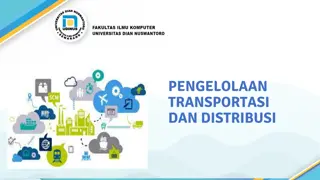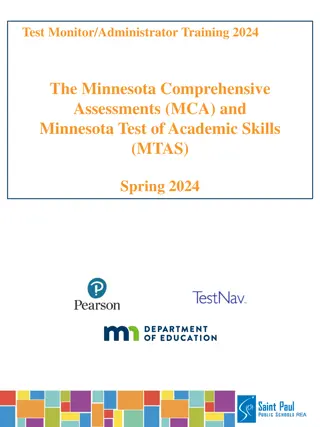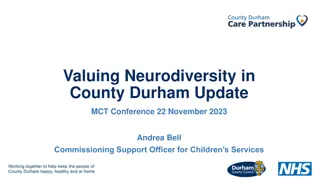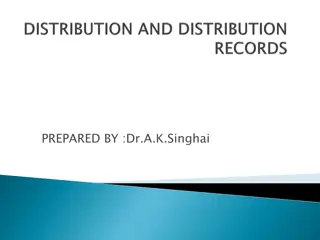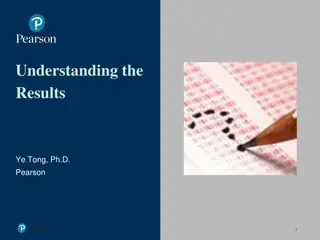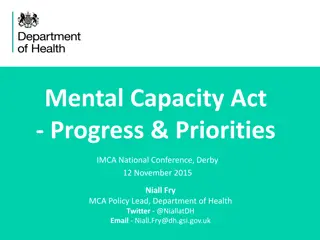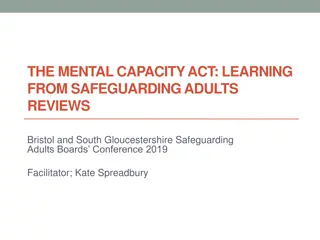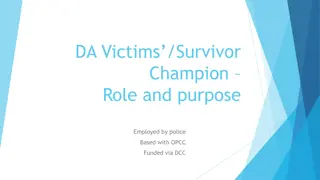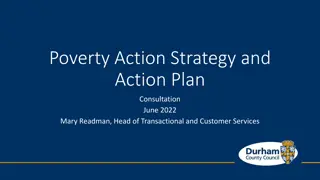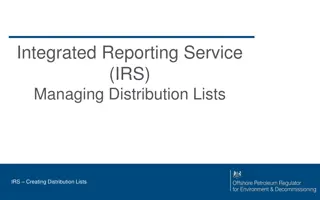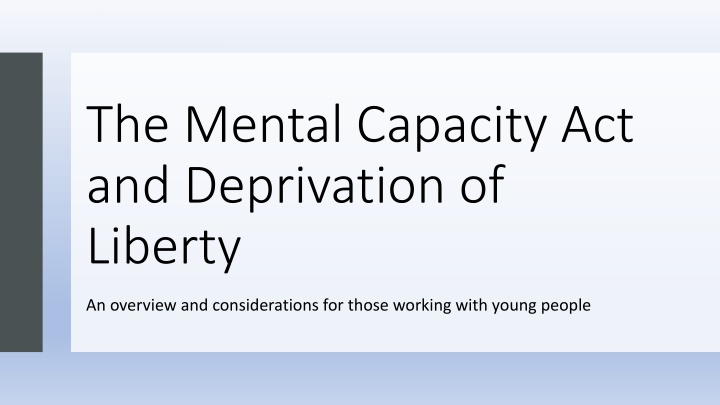
Mental Capacity Act and Deprivation of Liberty: Overview and Considerations
Gain insights into the Mental Capacity Act and its implications for young individuals. Explore definitions, rights, and responsibilities under the Act, including the application to children under 16 years old. Parental responsibility and decision-making within the zone of parental control are also discussed.
Download Presentation

Please find below an Image/Link to download the presentation.
The content on the website is provided AS IS for your information and personal use only. It may not be sold, licensed, or shared on other websites without obtaining consent from the author. If you encounter any issues during the download, it is possible that the publisher has removed the file from their server.
You are allowed to download the files provided on this website for personal or commercial use, subject to the condition that they are used lawfully. All files are the property of their respective owners.
The content on the website is provided AS IS for your information and personal use only. It may not be sold, licensed, or shared on other websites without obtaining consent from the author.
E N D
Presentation Transcript
The Mental Capacity Act and Deprivation of Liberty An overview and considerations for those working with young people
Theres no thou shalt from Government You are there, in front of the person, you ve got to do right by them Staff need Mental Capacity Act training rooted in Practice, not legalese [Andy Nicholl, 9thMarch 2016, Community Care Web Site, Staff need Mental Capacity Act training rooted in Practice, not legalese ]
The following definitions apply in the MCA and the Code of Practice: An Adult is a person aged 18 years or over. A Young Person is a person aged 16 or 17 years old. A Child is a person under the age of 16 years old. This differs from the Children Act 1989 and the law more generally where the term child is used to refer to people aged under 18.
In most situations, the care and welfare of children under 16 will continue to be dealt with under the Children Act 1989. There are, however, two parts of the MCA that apply to children under 16: Where the MCA Applies to Children under the age of 16 The Court of Protection can make decisions about a child s property or finances, (of can appoint a deputy to make these decisions), if the child lacks capacity to make to make such decisions within section 2(1) of the Act and is likely to still lack capacity to make financial decisions when they reach the age of 18. The criminal offence of ill treatment or willful neglect of a person who lacks capacity applies to children under 16 as no lower age limit is specified for the person caused harm/victim.
Parental Responsibility, (PR), refers to the rights, duties, powers, responsibilities and authority which by law a parent has in relation to a child , (Children Act 1989). Parental Responsibility lasts until the young person, ( child under Children Act 1989), is 18. People with PR for a young person may make decisions on behalf of that young person. The decisions that a person with PR can make are those decisions that are seen to sit within the zone of parental control. The zone of parental control is a legal concept describing which decisions a parent should be able to take concerning their child's welfare. Parental Responsibility and the MCA
There is no codified statement of which decisions come into the zone of parental control. However, the MHA Code of Practice, (36.10), notes two points that should be borne in mind when considering whether a decision comes within the zone of parental control: Is the decision one that a parent would be expected to make? Are there any indications that the parent might not act in the young persons best interests? We should also consider: Is the young person resisting? The nature/invasiveness of what is proposed. Parental Responsibility and the MCA
Under the Family Law Reform Act 1969, all people over the age of 16 are presumed to have the capacity to consent to surgical, medical or dental treatment and to associated procedures, such as investigations, anesthesia and nursing care. However, this presumption does not mean that a young person is able to make the relevant decision and decision makers should assess the young persons capacity to consent to the proposed care/treatment. If the young person lacks capacity to consent, then the MCA will apply in the same way as it does to adults. Consent to treatment
However, the Code of Practice says that if a young person lacks the capacity to make a specific care/treatment decision, the healthcare staff providing treatment, or the care staff providing care, can carry out treatment/care with protection from liability whether or not a person with PR consents. Consent to Treatment They must follow the Act s principles, consider all the factors in the checklist and ensure that the acts they carry out are in the young persons best interests. They must take into account the views of everyone interested in the young persons welfare, including those with PR.
The Twilight Zone of 16 The Twilight Zone of 16- -18 year 18 year olds olds Still a child (under 18) But can be subject to the MCA (over 16) Gillick competency - "parental right yields to the child s right to make his own decisions when he reaches a sufficient understanding and intelligence to be capable of making up his own mind on the matter requiring decision.
How did we get to where we are? The Mental Capacity Act The Bournewood Gap Cheshire West Lords Select Committee
Bournewood Case (HL v United Kingdom) 49 year old man with autism, lacked capacity, detained for about 3 months Not detained under the Mental Health Act 1983 but under common law doctrine of necessity lacks sufficient safeguards Incompatible with right to liberty Article 5 ECHR Deprivation of Liberty Safeguards are Implemented by Mental Health Act 2007, which amended Mental Capacity Act 2005 Bournewood
Cheshire West & Chester Council v. P. 39 year old man with cerebral palsy and Down s Syndrome tearing incontinence pads and eating them Intervention opening his mouth and inserting fingers to remove material P. placed in a body suit (like a babygrow) that could not open at the front to prevent him removing his pad
Court of Appeal (overturned Court of Protection Judgment) A good motive or intention could not render innocuous what would otherwise be a deprivation of liberty (Supreme Court) Some people are inherently restricted by their circumstances (Court of Appeal) Normality is concerned with what is normal for someone with a similar condition P. was not being deprived as this was normal for people like him Cheshire West cont
Supreme Court Disabled people should not face a tougher standard for being deprived of their liberty than a non-disabled person Baroness Hale If it would be a deprivation of my liberty to be obliged to live in a particular place, subject to constant monitoring and control, only allowed out with close supervision, and unable to move away without permission . Then it must also be a deprivation of liberty for a disabled person. The fact my living arrangements are comfortable, and indeed make my life as enjoyable as it could possibly be, should make no different. A gilded cage is still a cage. Cheshire West cont .
Is the person subject to continuous supervision and control? Is the person free to leave? If subject to both they are deprived of their liberty The following are not relevant: The persons compliance or lack of objection The relative normality of the placement The reason or purpose behind the placement Cheshire West cont .
House of Lords Select Committee (MCA) visionary piece of legislation lack of awareness and a lack of understanding it appears to be an optional add-on cultures of paternalism (in health) and risk-aversion (in social care)
We considered the safeguards separately from the rest of the Act, which is largely how they were perceived by our witnesses The legislative provisions and their operation in practice are the subject of extensive and wide- ranging criticism The provisions are poorly drafted, overly complex and bear no relationship to the language and ethos of the Mental Capacity Act. Evidence suggested that thousands, if not tens of thousands, of individuals are being deprived of their liberty without the protection Select Committee (DoLS)
What is mental capacity? The ability to make a decision. Includes ability to make decisions relating to daily living and more serious or significant decisions, also decisions that may have a legal consequence, for the person or others. Some people may need help to communicate a decision, but may still be able to make this - what matters is whether a person is able to carry out processes involved to make that particular decision. (Mental Capacity Act 2005 Code of Practice)
Mental Capacity Act 2005 underpinned by 5 key principles (set out in s.1 of the Act) 1. Presumption of capacity - person must be assumed to have capacity unless it is established that they lack capacity. Supported decisions - all practicable steps must have been taken to help person to make decision without success before they are treated as unable to make decision. Unwise decisions someone should not be treated as unable to make a decision just because they make what might be seen as an unwise decision. Best interests anything done for, or on behalf of, a person who lacks capacity must be done in their best interests. Least restrictive option someone making a decision or acting on behalf of person who lacks capacity must do so in a way that is least restrictive of the person s rights and freedom of action. 2. 3. 4. 5.
Every adult has the right to make their own decisions if they have the capacity to do so. Family carers and healthcare or social care staff must assume that a person has the capacity to make decisions, unless it can be established that the person does not have capacity. 1. Presumption of capacity (Mental Capacity Act 2005 Code of Practice, p.20)
Cannot be established as a result of particular medical condition or diagnosis; or merely by reference to age, appearance, condition or aspect of behaviour. Decision-specific. Time specific 1. Presumption of capacity [contd.] The presumption of capacity, in particular, is widely misunderstood by those involved in care. It is sometimes used to support non-intervention or poor care, leaving vulnerable adults exposed to risk of harm. In some cases this is because professionals struggle to understand how to apply the principle in practice. In other cases, the evidence suggests the principle has been deliberately misappropriated to avoid taking responsibility for a vulnerable adult. (paragraph 105)
Common phrases that suggest the presumption approach is not being adopted Peter Jackson in Heart of England NHS Foundation Trust v JB [2014] EWHC 342 (COP) One needs to be certain of her capacity [P] is unable to fully understand, retain and weigh information From A Brief Guide to Carrying out Capacity Assessments (2017) 39 Essex Chambers available at http://www.39essex.com/
People should receive support to help them make their own decisions. Before concluding that individuals lack capacity to make a particular decision, it is important to take all possible steps to try to help them reach a decision themselves. (Mental Capacity Act 2005 Code of Practice, p.20) 2. Supported decisions
People have the right to make decisions that others might think are unwise. A person who makes a decision that others think is unwise should not automatically be labelled as lacking the capacity to make a decision. 3. Unwise decisions (Mental Capacity Act 2005 Code of Practice, p.20) The concept of unwise decision-making faces institutional obstruction due to prevailing cultures of risk-aversion and paternalism. Select Committee Report
Unwise decisions cautionary note The Code of Practice states, repeated unwise decisions that put the person at significant risk of harm or of exploitation or someone making an unwise decision that is obviously irrational or out of character , does not necessarily mean they lack capacity but may warrant further investigation. (Mental Capacity Act 2005 Code of Practice, p.25)
2 stage capacity test: 1. Does the person have an impairment of the mind or brain, or is there some sort of disturbance affecting the way their mind or brain works? (It doesn t matter whether the impairment or disturbance is temporary or permanent.) If so, does that impairment or disturbance mean that the person is unable to make the decision in question at the time it needs to be made? (Mental Capacity Act 2005 Code of Practice, p.41) Assessing capacity 2.
PC and NC v. City of York Council [2013] and Kings College NHS Foundation Trust v C and V [2015] There are 3 elements and the order in the ACT is important Is the person unable to make the decision Is there an impairment or disturbance in the functioning of the person s mind or brain? If so.. Is the person s inability to make the decision because of the identified impairment or disturbance
Does the person have a general understanding of what decision they need to make and why they need to make it? Does the person have a general understanding of the likely consequences of making, or not making, this decision? Assessing ability to make a decision Is the person able to understand, retain, use and weigh up the information relevant to this decision? Can the person communicate their decision (by talking, using sign language or any other means)? Would the services of a professional (such as a speech and language therapist) be helpful? Assessing capacity to make more complex or serious decisions Is there a need for a more thorough assessment (perhaps by involving a doctor or other professional expert)? (Mental Capacity Act 2005 Code of Practice, p.41)
The two or more options for living Broad information about the area The difference between living somewhere and visiting it The activities the person being assessed would be able to do in each Whether and how the person would be able to see friends and family in each place The payment of rent and bills Any rules of compliance and/or general obligations of a tenancy Who they would be living with at each place The sort of care they would receive in each place The risk that a family member or other contact may not wish to see them if they choose a particular placement against someone wishes LBX v K, L and M (2013)
The final element The inability to make a decision is because of the impairment of mind or brain PC and NC v City of York Council Inability significantly related to mild learning disability This statement is not good enough - it needs to be because of The Causative Nexus You might want to consider the influence of third parties, for example? Also, the influence of lack of knowledge
Case Study Part 1 Thinking about the first three principles of the Mental Capacity Act (presumption of capacity, supported decision making, unwise decisions) What would you consider in this situation? What would you do? How would you approach the situation?
Case Study Part 2 What would your approach be? What things would you want to consider? What would indicate to you that Jessica s capacity may be in question? What is the question you are considering in relation to capacity? What is the salient information she would need to be able to understand for you to assess her as having capacity?
Re: A (Capacity: Social Media and Internet Use: Best Interests The case of A concerned a 21-year-old gay man with a learning disability and impairment in adaptive social functioning and executive functioning. He was sharing intimate photographs of himself online and was in contact with known sex offenders. Justice Cobb carefully considered the situation and concluded that online contact is different to other forms of contact and capacity in one does not necessarily translate to the other and notes that the question is specifically about contact and not general internet usage. This is important as internet usage can be very important for some with disabilities. He then goes on to consider the relevant information which the person needs to able to understand, retain, and use and weigh up and concludes .. What does he conclude? What is the relevant information?
Re: A (Capacity: Social Media and Internet Use: Best Interests Information and images (including videos) which you share on the internet or through social media could be shared more widely, including with people you don t know, without you knowing or being able to stop it; It is possible to limit the sharing of personal information or images (and videos) by using privacy and location settings on some internet and social media sites; The judge notes that the mechanisms for doing this do not need to be understood merely that it can be done. In considering someone s ability to use and weigh up information it is well established that it is the salient, or essential, elements that are important not usually the finer detail. If you place material or images (including videos) on social media sites which are rude or offensive, or share those images, other people might be upset or offended; The judge states he particularly uses language here like rude as he feels these are terms understandable to someone with a learning disability.
Re: A (Capacity: Social Media and Internet Use: Best Interests Some people you meet or communicate with ( talk to ) online, who you don t otherwise know, may not be who they say they are ( they may disguise, or lie about, themselves ); someone who calls themselves a friend on social media may not be friendly; Some people you meet or communicate with ( talk to ) on the internet or through social media, who you don t otherwise know, may pose a risk to you; they may lie to you, or exploit or take advantage of you sexually, financially, emotionally and/or physically; they may want to cause you harm; If you look at or share extremely rude or offensive images, messages or videos online you may get into trouble with the police, because you may have committed a crime;
Exercise In pairs talk for 5 minutes to see what you can find out about the person to help you make some decisions later - then swap take notes talk about your general day what you like to do what you don t like to do what s important to you ask whatever you think might be helpful to make a decision later
Any act done for, or any decision made on behalf of, someone who lacks capacity must be in their best interests. 4. Best Interests (Mental Capacity Act Code of Practice, p.20) Best interests decision-making is often not undertaken in the way set out in the Act: the wishes, thoughts and feelings of P are not routinely prioritised. Instead, clinical judgments or resource-led decision- making predominate. Select Committee report
Varies depending on the individuals circumstances and the type of care, treatment or decision being considered. E.g. Who can be a decision maker? Health and social care staff, family and unpaid carers can be the decision makers when decisions relate to carrying out an act on behalf of somebody who cannot consent. May be a joint-decision e.g. team of social care or health staff involved in decisions or recommendations about a care plan, or individual member of the team (different member of the team may implement the decision). The person delivering the care or treatment makes the decision about whether to deliver that care or treatment. Lasting Power of Attorney (for decisions within the scope of their authority).
Working out what is in someones best interests cannot be based simply on someone s age, appearance, condition or behaviour. (see paragraphs 5.16 5.17). All relevant circumstances should be considered when working out someone s best interests (paragraphs 5.18 5.20). Every effort should be made to encourage and enable the person who lacks capacity to take part in making the decision (paragraphs 5.21 5.24). What factors should you take into account? If there is a chance that the person will regain the capacity to make a particular decision, then it may be possible to put off the decision until later if it is not urgent (paragraphs 5.25 5.28). Special considerations apply to decisions about life-sustaining treatment (paragraphs 5.29 5.36). The person s past and present wishes and feelings, beliefs and values should be taken into account (paragraphs 5.37 5.48). The views of other people who are close to the person who lacks capacity should be considered, as well as the views of an attorney or deputy (paragraphs 5.49 5.55).
Encourage Participation Identify all relevant circumstances Find out the persons views Avoid discrimination Assess if the person might regain capacity Does the decision concern life- sustaining treatment Consult others Avoid restricting the persons rights Take all of this into account Best Interest Checklist
It is a process to make a decision for someone but is not an off switch for their rights and freedoms The purpose of the best interests test is to consider matters from the patients point of view Aintree University NHS Hospital Trust v James What is required in a given case will depend upon urgency and gravity Considerations
It is essential that the assessor provides an independent objective view As far as is practical and possible seek the views of: Anyone the person has previously named as someone they want to be consulted Anyone involved in caring for the person (and examine relevant needs assessments and care plans for the person) Anyone interested in the person s welfare (for example, family carers, close relatives, an advocate already involved) Any donee or deputy who represents the person Process: Consultation
Baroness Hale of Richmond had emphasised that the purpose of the best interests test is to consider matters from the patient s or from the person s point of view . Mr Ruck Keene suggested that all those who practise in the area will be emphasising that message loud and clear . Kirsty Keywood told us that placing greater emphasis on the role of P in the best interests process, while simultaneously diminishing the importance of objective criteria, could achieve a closer alignment with the requirements of the United Nations Convention of the Rights of Persons with Disabilities, since the will, rights and preferences of P should be the starting point for any kind of determination of what is best for an individual .
5.59 Section 4(9) confirms that if someone acts or makes a decision in the reasonable belief that what they are doing is in the best interests of the person who lacks capacity, then provided they have followed the checklist in section 4 they will have complied with the best interests principle set out in the Act. Coming to an incorrect conclusion about a person s capacity or best interests does not necessarily mean that the decision-maker would not get protection from liability (this is explained in chapter 6). But they must be able to show that it was reasonable for them to think that the person lacked capacity and that they were acting in the person s best interests at the time they made their decision or took action. Protection
What words come to mind when you think of risk? Risk Social Construction of risk. How do you decide whether to take a risk or not?
Risk: The process VULNERABILITIES TRIGGERS & HAZARDS MITIGATING FACTORS AND STRENGTHS
The possibility that something may go wrong in the future amplifies the perceived risk in the present (Beck, 1992 Risk Society, Sage) Society is now characterised by the precautionary principle or better safe than sorry (Furedi, 1997, Culture of Fear, Cassell) Risk
Likelihood and impact Decision making is often choosing between two unattractive option Risk
Acceptable and unacceptable risk (Wheres your line?) Autonomy and self determination v. protection Static Risk factors and Dynamic Risk factors Risk



